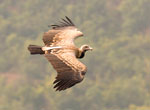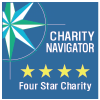BOISE, Idaho – The number of critically endangered Long-billed Vultures in Pakistan is beginning to recover, thanks to a ban on the use of diclofenac, a veterinary drug that is toxic to vultures, according to a new study by The Peregrine Fund.
The article, “First evidence that populations of the critically endangered Long-billed Vulture Gyps indicus in Pakistan have increased following the ban of the toxic veterinary drug diclofenac in south Asia,” was written by M. Jamshed I. Chaudry, Darcy L. Ogada, Riffat N. Malike, Munir Z. Virani, and Matthew D. Giovanni. It will be published in the peer-reviewed journal Bird Conservation International and is available online at: http://journals.cambridge.org/bci/Virani
Before the 2006 ban, vulture populations in Pakistan, India, and Nepal had dropped by up to 99%. Diclofenac, then a new drug in the veterinary market, was widely used to treat ailing cattle and other livestock, but vultures began dying by the thousands. The birds suffered renal failure after ingesting diclofenac-treated carcasses that had been left in the fields for scavengers.
By 2008, two years after the ban, breeding populations of the Long-billed Vulture at the study sites in Pakistan had increased by up to 52%, the study shows.
“Our results demonstrate for the first time since the onset of the Asian vulture crisis that the ban on veterinary diclofenac is an effective management tool for reversing Long-billed Vulture population declines in the study area,” the authors said.
The Peregrine Fund discovered in 2003 that diclofenac was responsible for the catastrophic collapse of vulture populations throughout South Asia. The drug was banned for veterinary use in 2006 by India, Pakistan, and Nepal and in 2010 by Bangladesh.
Recent surveys in India indicate that the ban on veterinary use of diclofenac has markedly reduced its levels in livestock carcasses to almost half of what they were prior to and immediately after the ban, but levels remain sufficiently high to continue to be a problem for vultures, the study said.
“Despite this encouraging trend, we have a long way to go to fully recover vulture populations throughout South Asia,” said author Virani, who heads up vulture studies for The Peregrine Fund. “Unfortunately, some livestock owners are illegally using the human version of diclofenac to relieve pain and inflammation in their animals, even when alternatives that are less toxic to vultures are available.”
Vultures are social animals, so just one contaminated carcass can poison many birds, he said.
The Long-billed Vulture breeding colony studied for this project is located on a series of cliffs in the Karunjhar Hills in Sindh Province on the extreme southeastern border of Pakistan. For up to two weeks in November and March, researchers counted the number of birds in each age class, occupied nests, unoccupied nests, nestlings, and fledglings.
Results showed that sharp declines between the 2003-04 breeding season and the 2006-07 breeding season began to be reversed in the 2007-08 season and have held steady since, the study said.
Did you know?
- Long-billed Vultures generally lay eggs in November; fledging occurs mid-March to mid-May.
- They nest in colonies of up to 20 pairs.
- They are about 3 feet (0.91 m) tall, weigh 12-14 pounds (5.4-6.4 kg), and have a wingspan of 6-8 feet (1.83-2.44 m).
- Like all vultures, they have bald heads and broad wings built for soaring great distances with minimal effort.
For more information, contact:
Erin Katzner
Director of Global Engagement
Main Phone: 208-362-3716
Direct Phone: 208-362-8277






